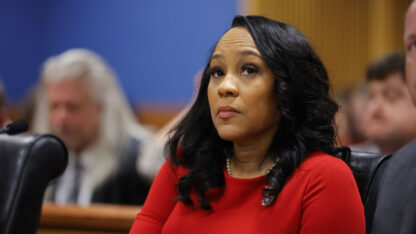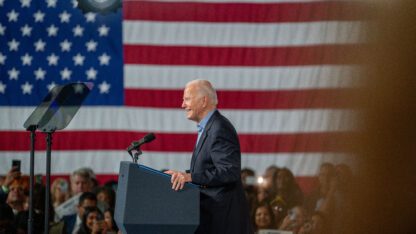Updated at 7:37 p.m.
Immigration takes center stage as the Republican National Convention resumes Tuesday, with speakers spotlighting a key element of former President Donald Trump ’s political brand that helped endear him to the GOP base when he began his first campaign in 2015.
Among speakers slated for Tuesday night were families who’ve been impacted by violent crime — part of a GOP strategy to link crime to border policies. They include the family of Rachel Morin, a Maryland woman whom prosecutors say was killed and raped by a fugitive from El Salvador and whose story has been frequently highlighted by Trump on the campaign trail.
Immigration has long been one of Trump’s banner issues, as he has criticized the unprecedented number of migrants entering the country illegally through the U.S. border with Mexico. The numbers of unauthorized crossings have fallen abruptly after President Joe Biden issued a rule suspending many asylum claims at the border.
At rallies and other campaign events, Trump has pointed to examples of migrants who committed heinous crimes and has blamed migration for the trafficking of drugs like fentanyl, even though federal data suggests many people smuggling fentanyl across the border are U.S. citizens. His anti-immigrant rhetoric has also strayed into talking points not backed by evidence, including unfounded claims that migrants are entering the country to vote in the 2024 election.
Meanwhile, for all the negative talk, the mood at the Milwaukee convention is colored by joy and gratitude at Trump’s presence after surviving the attempted assassination Saturday at a rally in Pennsylvania. His ear bandaged, Trump appeared at Monday night’s session to rousing cheers, his expression often seeming subdued.
Trump and Ohio Sen. JD Vance, his vice presidential choice, are scheduled to appear in the convention hall every night, according to two people familiar with the schedule who were not authorized to speak publicly.
The nominee and his newly minted running mate sat together Monday night in Trump’s first public appearance following the assassination attempt. Vance is expected to give his own speech Wednesday night, with Trump to headline Thursday night’s closing evening.
Pennsylvania Republican Party Chairman Lawrence Tabas said he hoped the assassination attempt on Trump would reset the tone nationally, beginning with Trump’s scheduled remarks Thursday.
“After a brush with death, I do believe – going through that – that his message will be better, and I think will appeal to our better emotions,” Tabas said in an interview after the Pennsylvania GOP’s delegation breakfast in suburban Milwaukee.
Tuesday’s program includes several Republican candidates for U.S. Senate in some of the closest races this fall, including Bernie Moreno from Ohio, Sam Brown from Nevada and Tim Sheehy from Pennsylvania.
In the latest signal the party is solidifying to take on President Joe Biden in November, several of Trump’s fiercest GOP primary rivals will also speak Tuesday. They include former South Carolina Gov. Nikki Haley, Florida Gov. Ron DeSantis and biotech entrepreneur Vivek Ramaswamy.
A senior Trump campaign adviser said Haley’s planned appearance shows how Republicans have mended any fences in need of repair following the bruising primary season.
In the latest scene in a presidential campaign already defined by dramatic turns, Trump appeared triumphantly to wild cheers at the convention’s opening night Monday. That was hours after the convention had formally nominated the former president to head the Republican ticket in November against Biden.
The raucous welcome underscored the depth of the crowd’s affection for the man who won the 2016 nomination as an outsider, at odds with the party establishment, but has vanquished all Republican rivals, silenced most conservative critics and now commands loyalty up and down the party ranks.
Trump, who has long decried rivals with harsh language and talked about prosecuting opponents if he wins a second term, seemed poised to deliver a more toned-down speech. His eldest son, Donald Trump Jr., said in an Axios interview outside the RNC that he spent three or four hours going through his father’s convention speech with him, “trying to de-escalate some of that rhetoric.”
“I think it lasts,” the younger Trump said of the change in his father’s rhetoric. “There are events that change you for a couple minutes and there are events that change you permanently.”
At the convention, Georgia Gov. Brian Kemp, who fell out with Trump over his refusal to go along with the former president’s election falsehoods, called the moment “a great opportunity and the country and the media need to say regardless of the side of the political aisle we’re on, we need to get back to the side of civil discourse and not try to demonize people.”
Still, several Republicans made clear that their calls for harmony and unity did not mean finding common ground with Biden and Democrats, who find themselves still riven by worries that the 81-year-old is not up to the job of defeating Trump.
Pennsylvania delegate John Fredericks had a simple recommendation for Tuesday’s immigration speakers, “Close the border. If you’re here illegally, get them out – now. That’s all I’m interested in. Get them out.”









